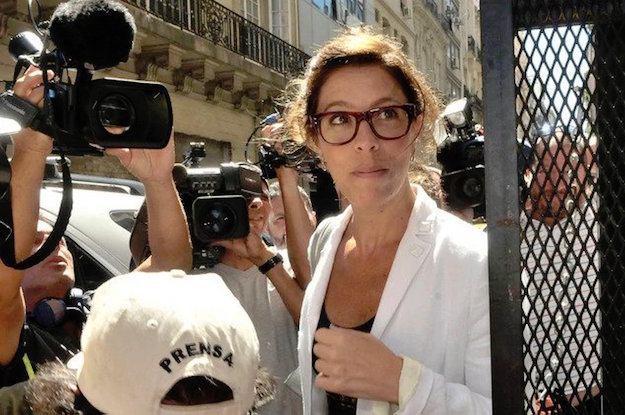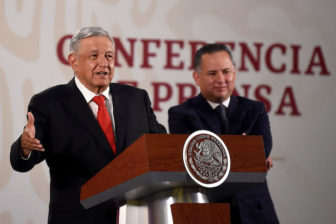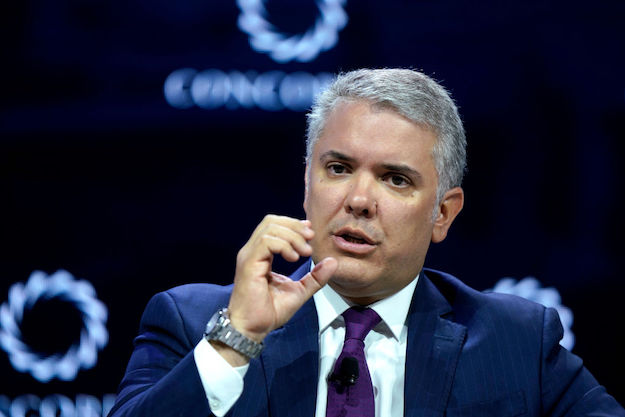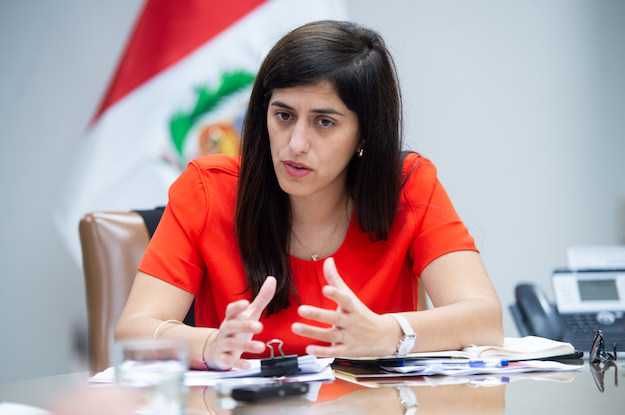Click here to read more about Argentina’s presidential race.
BUENOS AIRES – The day I met Laura Alonso, the head of the Argentine government’s anti-corruption office, protesters were holding a rally against President Mauricio Macri just blocks away. But Alonso was focused instead on an uprising happening 3,000 miles away in Venezuela, which for her echoed the polarization at home.
“We are discussing two ways of living (in Argentina),” she said, warning that October elections would be a choice between “liberal democracy and dictatorship.”
Such comments capture the political approach Alonso has brought to the job since late 2015. It’s a style that has won her legions of admirers – as well as critics, who say anti-corruption work should rise above Argentina’s strong partisan divide.
But Alonso has long paired political work with her anti-corruption efforts, both as the former head of Transparency International’s Argentina chapter and as a legislator in Macri’s party from 2009 to 2015. She dismisses most criticism as partisan sniping from the “populist” opposition, and said her legislative career has been an asset in her current role. Her office, which employs a staff of 113 and sits five blocks from the Casa Rosada, Argentina’s presidential palace, is mostly tasked with crafting and promoting the government’s anti-corruption policies, though it also has prosecutorial powers and can oversee investigations into state corruption.
Anti-corruption “is not only for lawyers,” Alonso told AQ. “We are not chasing a person. We are not chasing a company. Our main work and contributions are institutional reforms.”
By that measure, Alonso’s work has helped dramatically expand the scope of corruption investigations and has also pushed several important reforms through Congress.
Those reforms include an access to information law, similar to a bill Alonso first tried to pass as a congresswoman a decade ago, as well as a whistleblower protection law which, while imperfect, has been instrumental in the prosecution of Argentina’s massive “Notebooks” corruption case. Alonso’s office has also worked with Macri to pass several executive decrees, covering issues like the regulation of conflicts of interest and, in April 2019, the launch a five-year national anti-corruption plan.
In May, Alonso hosted an event at the Casa Rosada to launch new integrity guidelines for state-owned companies, a by-product of a corporate liability law enacted last year. Alonso’s office produced the law in 2017 to bring Argentina in line with the Organization for Economic Cooperation and Development’s anti-bribery standards at a time the country is trying to join the club of mostly rich nations. The law holds companies liable for their employees’ corrupt acts and incentivizes compliance programs. At the event, executives from Argentina’s largest public firms spoke highly of the new guidelines.
“It’s a game changer,” said Alonso, who called the corporate liability and whistleblower reforms her biggest contributions to her country.
“What we in the government have created are real policies to prevent corruption.”
Nevertheless, some analysts fear Alonso’s tenure has politicized the anti-corruption office to the point that it may undermine its accomplishments.
The criticism started in 2015 when Macri tapped Alonso, then a legislator in the lower house, to lead the office. Existing rules reserved the position for a lawyer, which Alonso wasn’t, so Macri passed a presidential decree that allowed her to take the position.
It made sense for an agency crafting policy to be led by a political scientist like herself, Alonso said.
But the idea that Macri had twisted the rules to put an ally in his government’s top anti-corruption position has given ammunition to targets of Alonso’s investigations, including former President Cristina Fernández de Kirchner and her associates.
“Alonso is more of an accomplice for the government than an investigator of kirchnerismo,” presidential candidate and Kirchner’s running mate Alberto Fernández said in a June interview.
After Macri’s implication in the Panama Papers scandal, Alonso tweeted that starting an offshore company in a tax haven was “not a crime in itself.” In April, she made waves when she said that her office was not pursuing any corruption cases against members of Macri’s government, citing a need to avoid accusations of favoritism.
Critics nevertheless interpreted that as an admission of Alonso’s partiality. In 2018, her office was a plaintiff in 41 cases – none involving members of Macri’s government, according to Chequeado’s analysis of Supreme Court data.
The tension surrounding Alonso’s handling of corruption cases underscores a wider national distrust of the judiciary, Argentina’s least-trusted institution according to polls. It’s a problem that’s been getting worse: The share of Argentines who have confidence in the judiciary fell from 20.1% in 2015, when Macri was elected, to just 7% in 2018, according to the Catholic University of Argentina’s Social Debt Observatory. Favoritism among judges and prosecutors and questionable pacing of investigations irk Argentines on both ends of the political spectrum.
But the anti-corruption office’s work is “more policy than cases,” Alonso told AQ, “which is not what you usually see in the press.”
Alonso has moved to address concerns about the office’s dependence on the justice ministry for its budget, which experts say hinders its ability to be a robust check on corruption.
“Since the office doesn’t have independence and autonomy from the executive, its decision-making power is always very limited,” said Joaquín Caprarulo of the Civil Association for Equality and Justice (ACIJ), a non-profit group that does anti-corruption work.
Others echoed the need for reforms.
“The office has a big name with lots of duties, but with very limited capacities,” said Pablo Secchi, the executive director at Poder Ciudadano. “Its charge should be to make recommendations on transparency policies, but investigative work needs to go to a technocrat.”
To foster more independence, Alonso’s office has proposed a reform of Argentina’s public ethics law, which aims to give the office more autonomy. The office sent the reform to Congress earlier this year, but election year politics make its fate uncertain – an example of the challenges that arise when anti-corruption becomes political.
It’s clear, however, that for Alonso, fighting corruption is in fact political. If Macri loses to Fernández in October’s election, the “advances against corruption would fall like a house of cards,” Alonso said in a recent interview.
“It’s life or death for the country,” she told AQ.
However, Alonso added that reform will still take time even if Macri is reelected.
“This is not a picture, it’s a film,” she said. It’s a film that, according to Alonso, started in 2008 when then-President Kirchner raised export taxes on soy farmers, fracturing her coalition and touching off a transition from populist policies that Macri has accelerated. Alonso sees criticism of her work – and of the president – as part of an effort to derail the transition’s completion.
“When you think about this as a long-term or medium-term process, I’m not surprised that we are having this kind of struggle at the end.”
—
O’Boyle is a senior editor at AQ. Follow him on Twitter @BrenOBoyle.








